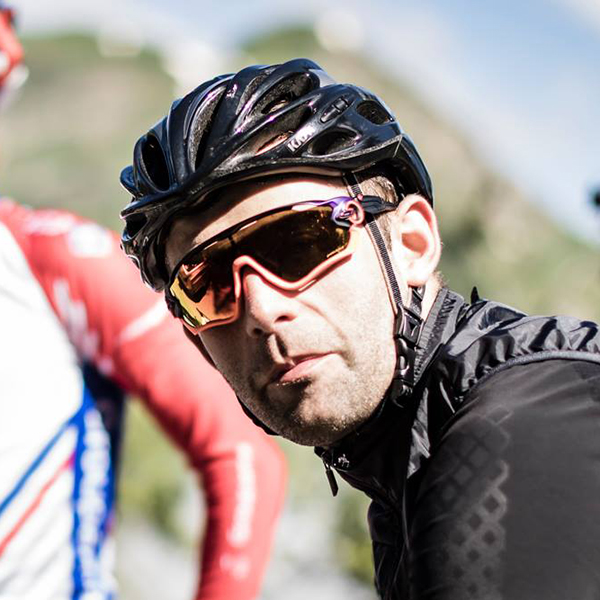Pinarello launched the new F-Series range of bikes in early 2023, replacing the Prince as a more affordable race bike that underpins the Ineos-Grenadiers-ridden Dogma F.
The geometry was carried over from the flagship race bike, but Pinarello had made some concessions to the overall feature mix and carbon layup.
Having said that, the Italian brand said the F-Series is a pure-bred race bike ideal for all kinds of blacktop racing and fast sportive riding.
I could feel that sharp, race bike DNA while testing the F7 – it’s stiff in all the right areas, responds to the lightest touch when the road gets technical and feels efficient when riding at higher speeds.
That said, the disappointing wheels and tyres leave performance on the table, while the ride can feel slightly too rigid at times.
Pinarello F7 Ultegra Di2 frame
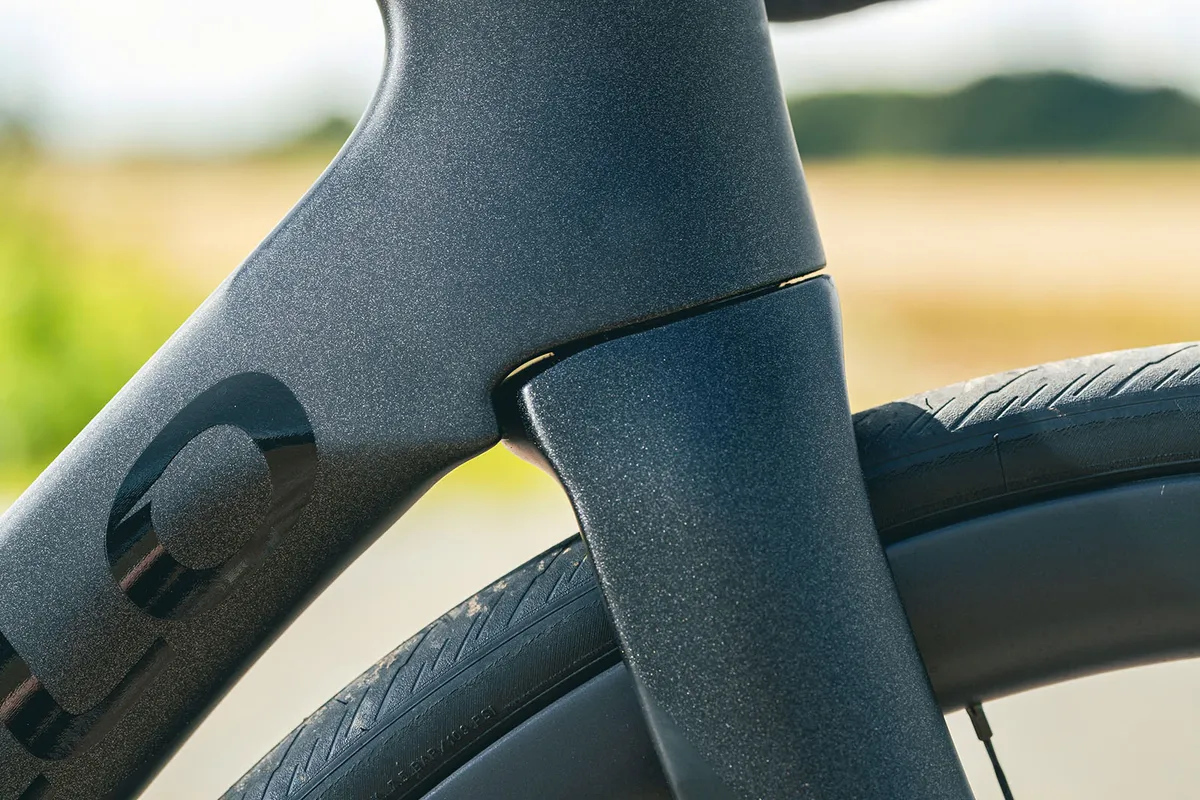
The Pinarello F7 sits in the middle of the brand’s second-tier race bike range, above the F5 and below the F9.
Like the F9 (which currently is only available in Europe and the US), the F7’s frame uses Toray T900 carbon fibre.
This differentiates the F-Series from the Dogma F, which headlines with a more exotic T1100 1K makeup.
However, Pinarello claims T900 provides all the wishlist characteristics one should look for in a race bike, while it says this frame is raced competitively by its sponsored teams (Ineos-Grenadiers excepted).
The frame is claimed to weigh 950g in a size 530 (roughly equivalent to a size 54cm bike).
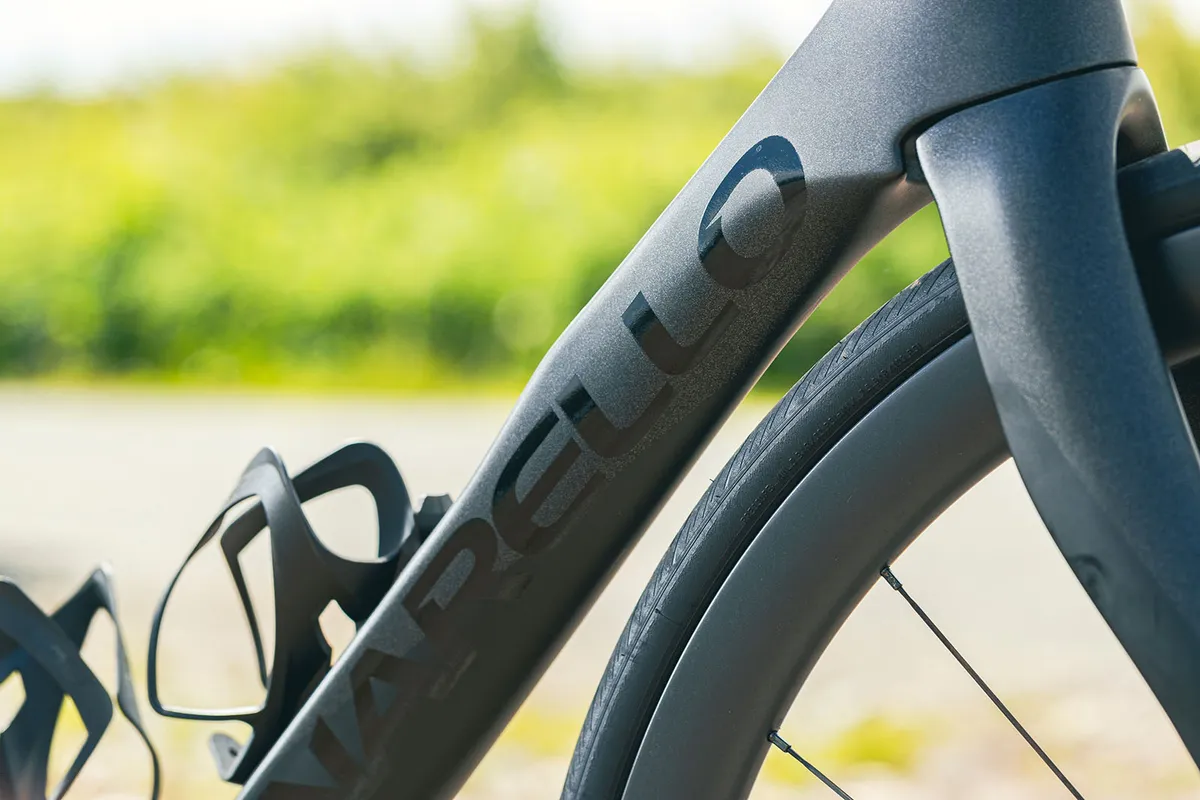
Visually, the frame carries over many traits of the Dogma F and its forebear, the Prince.
There’s the distinctive top-tube bend, a wavy Onda fork profile with dropout fairings, down- and outward-kinking seatstays, a shrouded downtube bottle cage and a proprietary 1.5in headset/steerer design.
Blink as it whizzes past you, and you might mistake it for a Dogma F (or, indeed, any racy Pinarello road bike from the past five years or so).
Pinarello’s designers certainly intend it to whizz along, judging by the deep headtube and downtube with flatback aerofoil shaping applied throughout.
Meanwhile, the neat teardrop-shaped spacers help smooth airflow from the carbon Most Talon Ultra Light integrated bar-stem.
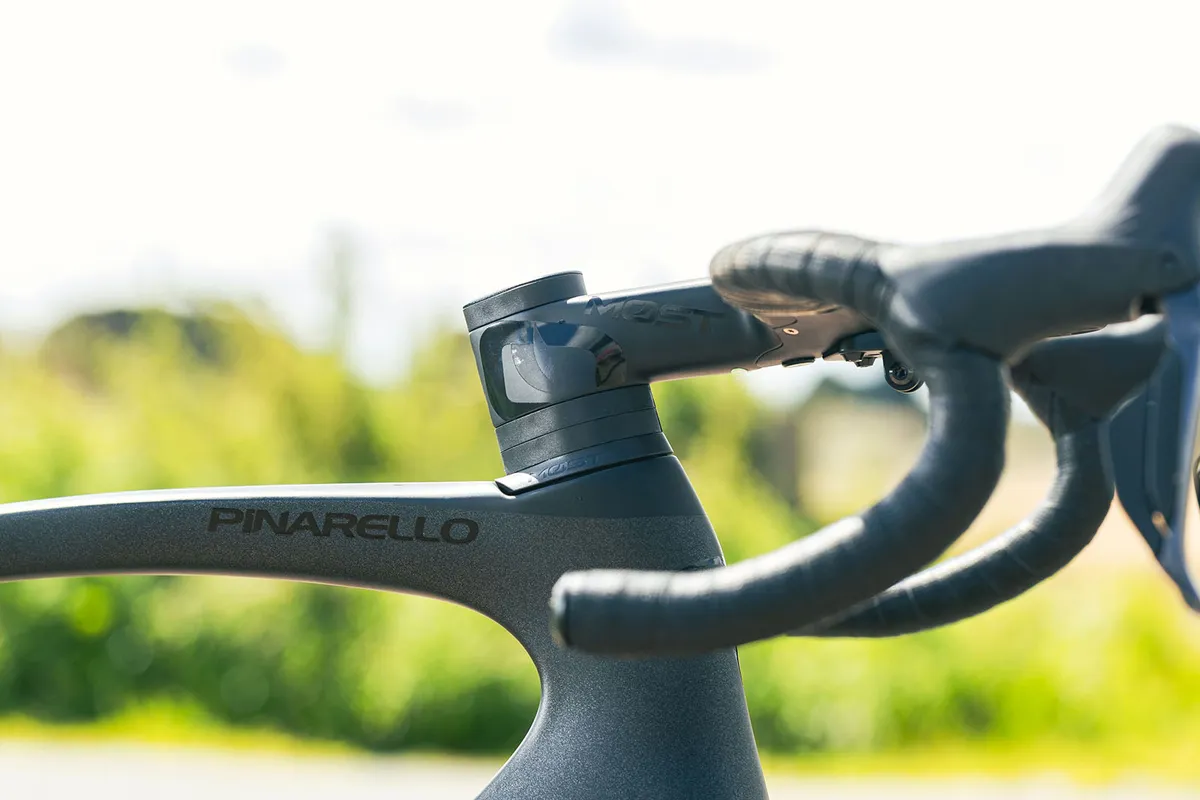
The proprietary bladed seatpost is narrow, slotting into an (almost) equally slim seat tube. It fixes in place via a 3D-printed titanium wedge clamp accessible from the top side of the top tube.
All together, Pinarello says this improves the aerodynamics of the rear triangle, alongside its flaring shape.
Despite the obvious aero profiling, the Italian brand keeps its counsel when it comes to performance figures.
The frame has clearance for 30mm-wide road bike tyres and uses an Italian threaded bottom bracket.
Pinarello F7 Ultegra Di2 geometry
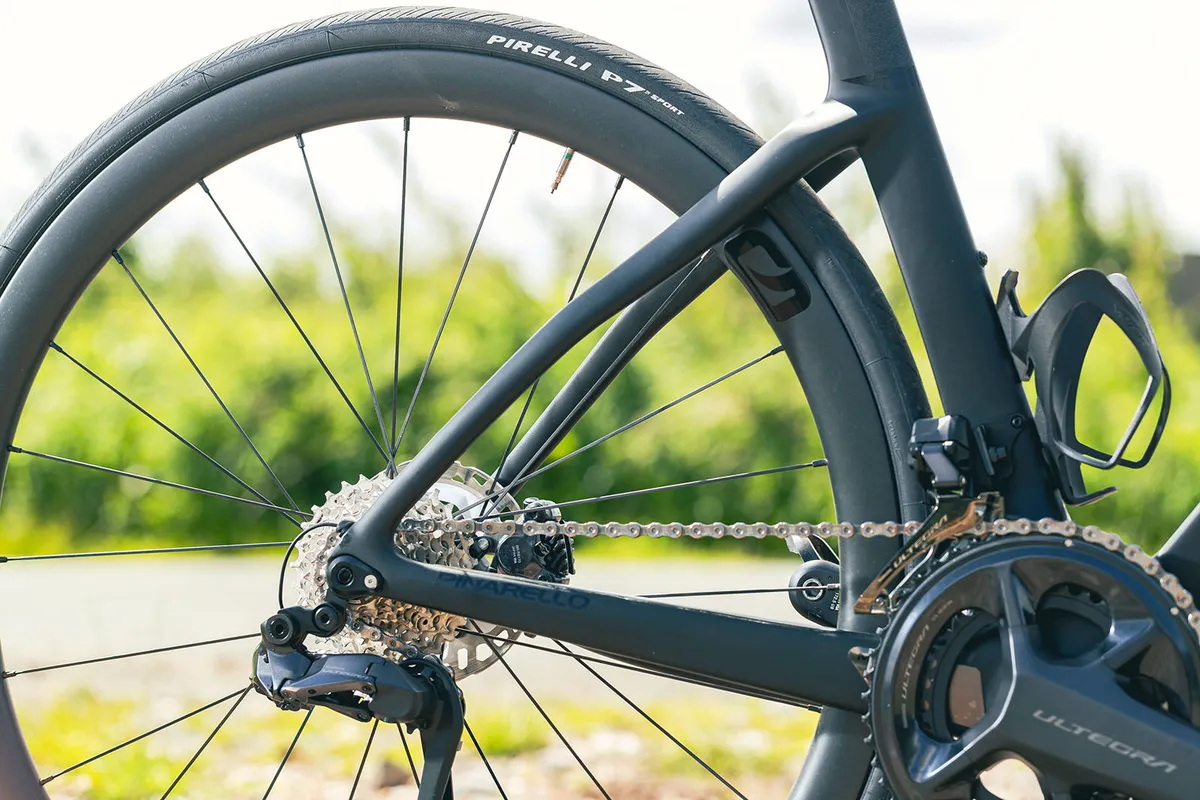
The Pinarello F7’s geometry comes from the playbook of race bike design.
My size 560 bike had a steep 73.2-degree headtube angle married to a 73-degree seat tube pitch, which fed the bike’s sharp handling while pitching me over the bottom bracket (seatpost setback notwithstanding).
A size 560 brings a 390.8mm reach figure, with a 570.3mm stack. The latter is notably tall when you compare it to a Specialized S-Works Tarmac SL7, which measures 555mm in a size 56cm.
However, this means the F7’s ride position is aggressive without being overly so – a feeling strengthened by the presence of 25mm of spacers above the headtube cap.
The chainstays are 410mm long, intended to bring a whip-like response and handling through the rear of the bike.
Instead of a consistent chainstay length across the size range, these drop to 408mm for sizes 500, 515 and 530, and to 406mm for sizes 430 and 465 to preserve handling, according to Pinarello.
| | 430 | 465 | 500 | 515 | 530 | 545 | 560 | 575 | 595 |
|---|---|---|---|---|---|---|---|---|---|
| Seat angle (degrees) | 74.4 | 74.4 | 74 | 73.7 | 73.7 | 73.4 | 73 | 73 | 72.4 |
| Head angle (degrees) | 69.5 | 70.5 | 71.4 | 72 | 72.5 | 72.8 | 73.2 | 73.7 | 73.4 |
| Chainstay (mm) | 406 | 406 | 408 | 408 | 408 | 410 | 410 | 410 | 410 |
| Seat tube (mm) | 430 | 465 | 500 | 515 | 530 | 545 | 560 | 575 | 595 |
| Top tube (mm) | 500 | 515 | 525 | 535 | 545 | 555 | 565 | 578 | 600 |
| Head tube (mm) | 97 | 104 | 109 | 114 | 123 | 138 | 149.5 | 178 | 220 |
| Fork offset (mm) | 43 | 43 | 43 | 43 | 43 | 43 | 43 | 43 | 43 |
| Bottom bracket drop (mm) | 67 | 72 | 72 | 72 | 72 | 72 | 72 | 72 | 67 |
| Stack (mm) | 502.5 | 517.7 | 525.5 | 532.3 | 542.6 | 557.9 | 570.3 | 599.3 | 633.5 |
| Reach (mm) | 351.3 | 365.2 | 372.1 | 378.1 | 385.6 | 388.3 | 390.8 | 395.4 | 400.3 |
Pinarello F7 Ultegra Di2 build
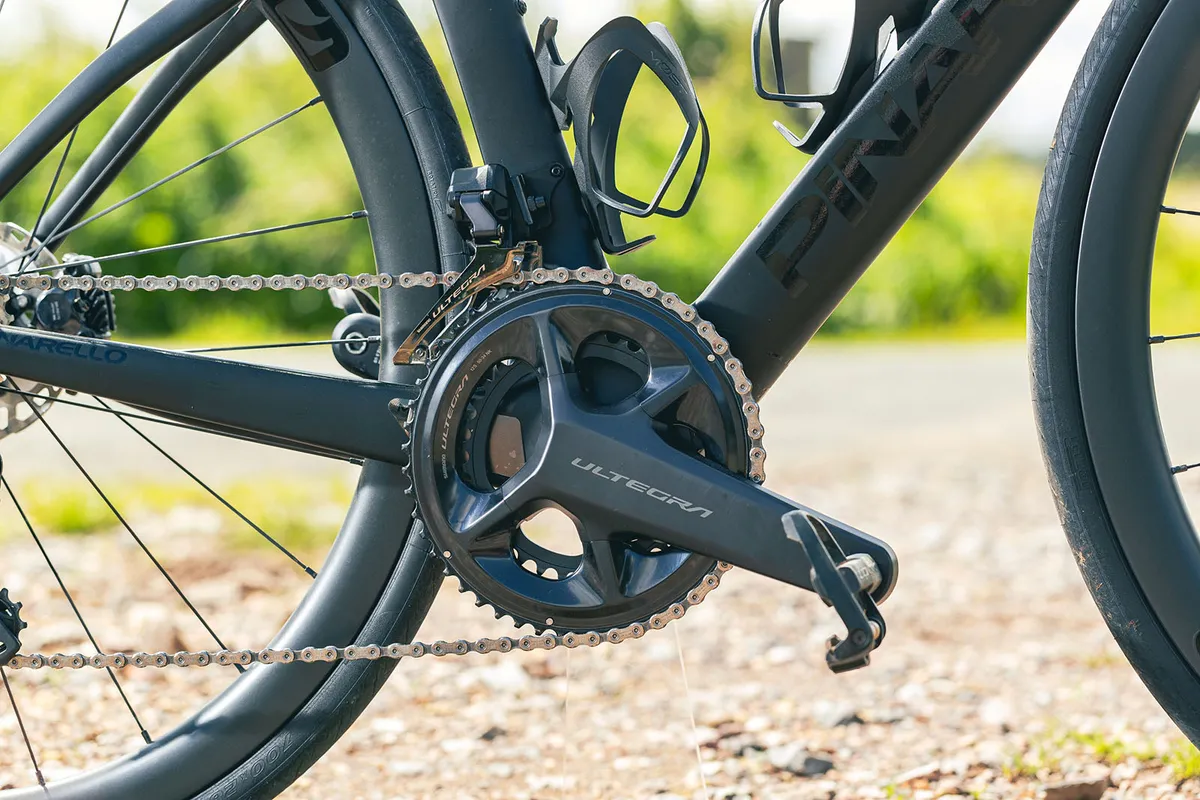
The F7 comes with a Shimano Ultegra Di2 R8100 build, although a SRAM Force AXS build is also available with precisely the same finishing kit.
The crankset comes with 52/36 tooth chainrings, and the 11-30 tooth cassette is fitted out back.
As it is, the specs will probably suit the majority of riders who want to use the F7 for competitive riding.
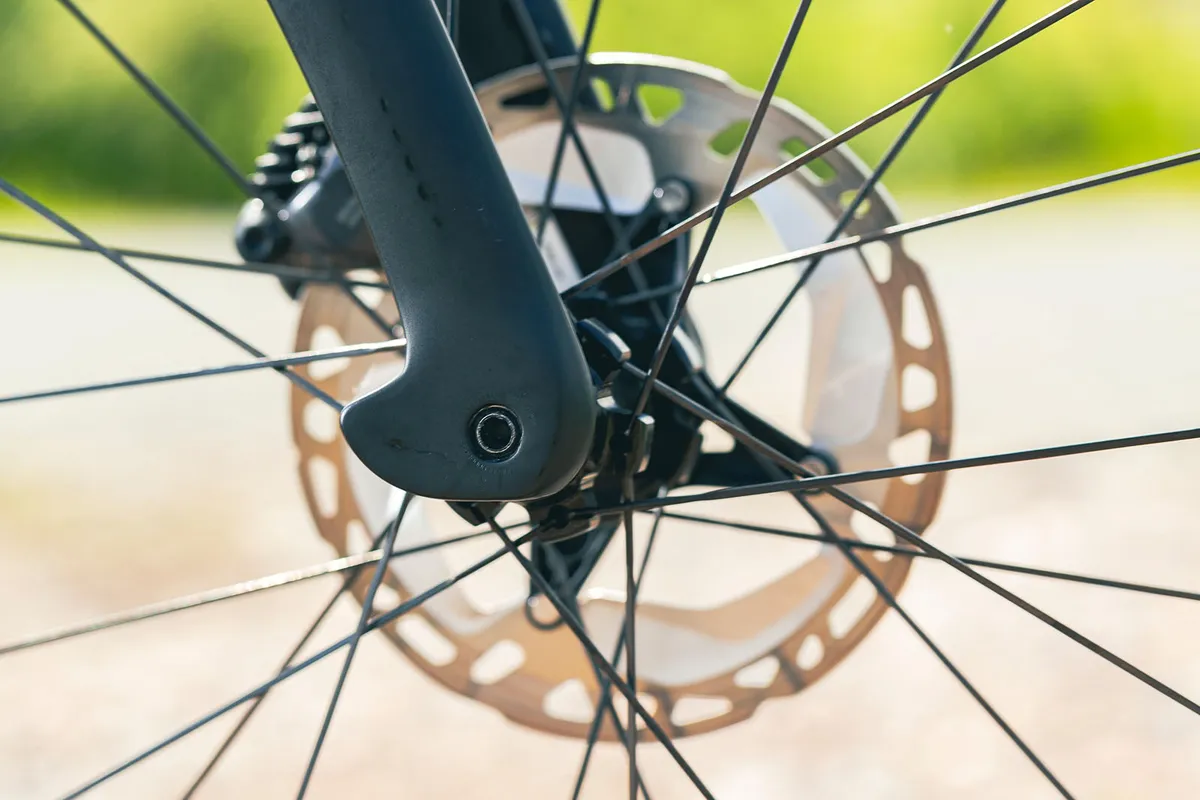
Usefully, Pinarello offers the Most Talon Ultra Light cockpit in 16 sizes, but only 42, 44 and 46cm wide, with stems ranging from 90-140mm in 10mm increments.
The 90mm length isn’t available with the 46cm wide bar, while the 140mm length can’t be had with a 42cm bar.
Although cantering the levers inward can go a small way to mitigating this, I’d prefer the option of the 40cm bar for my optimum fit, while many people smaller and narrower than me (I’m a swimmer-shouldered 188cm tall) will prefer 38cm or less.
You can opt to swap in one of Pinarello’s TiCR routing-compatible stems instead and fit a separate 31.8mm handlebar, but doing so is likely less aero-efficient, not as stiff, and certainly less neat.
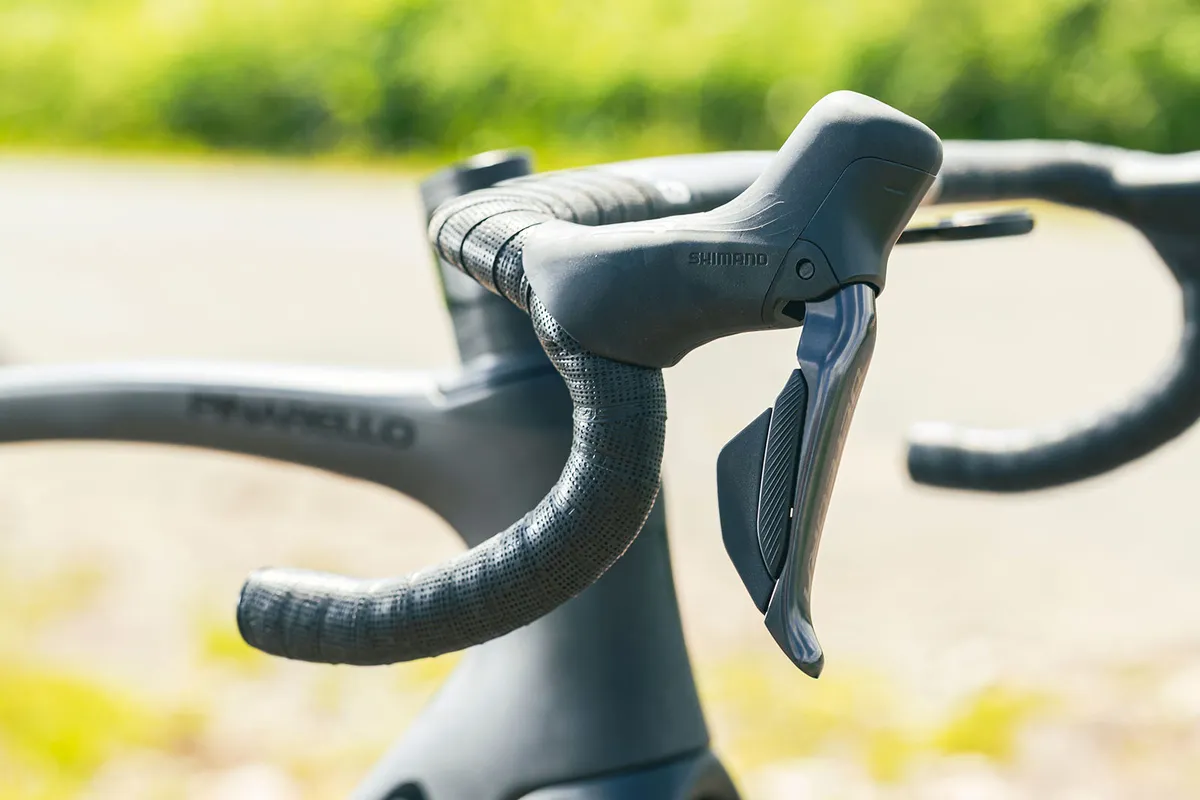
Pinarello says that swapping these in-house components at the point of purchase is at the individual dealer’s discretion, so there’s no guarantee doing so won’t incur an extra cost.
The F7 comes specced with a Most Ultrafast 40 carbon wheelset.
This has Vision-branded hubs, which are an indicator of the wheelset’s DNA: it’s actually a rebadged Vision SC40 Disc wheelset (we’ve reviewed the deeper SC55 hoops).
This comes with a 19mm-deep internal channel and a hooked rim design, with tubeless compatibility.
It comes fitted with 700x28mm Pirelli P7 Sport tyres, Pirelli’s training-oriented clincher model with a 60TPI (thread-per-inch) casing and third-tier ‘Pro Compound’ rubber.
The saddle is a Most Aircross-badged Selle Italia Model X saddle with alloy rails.
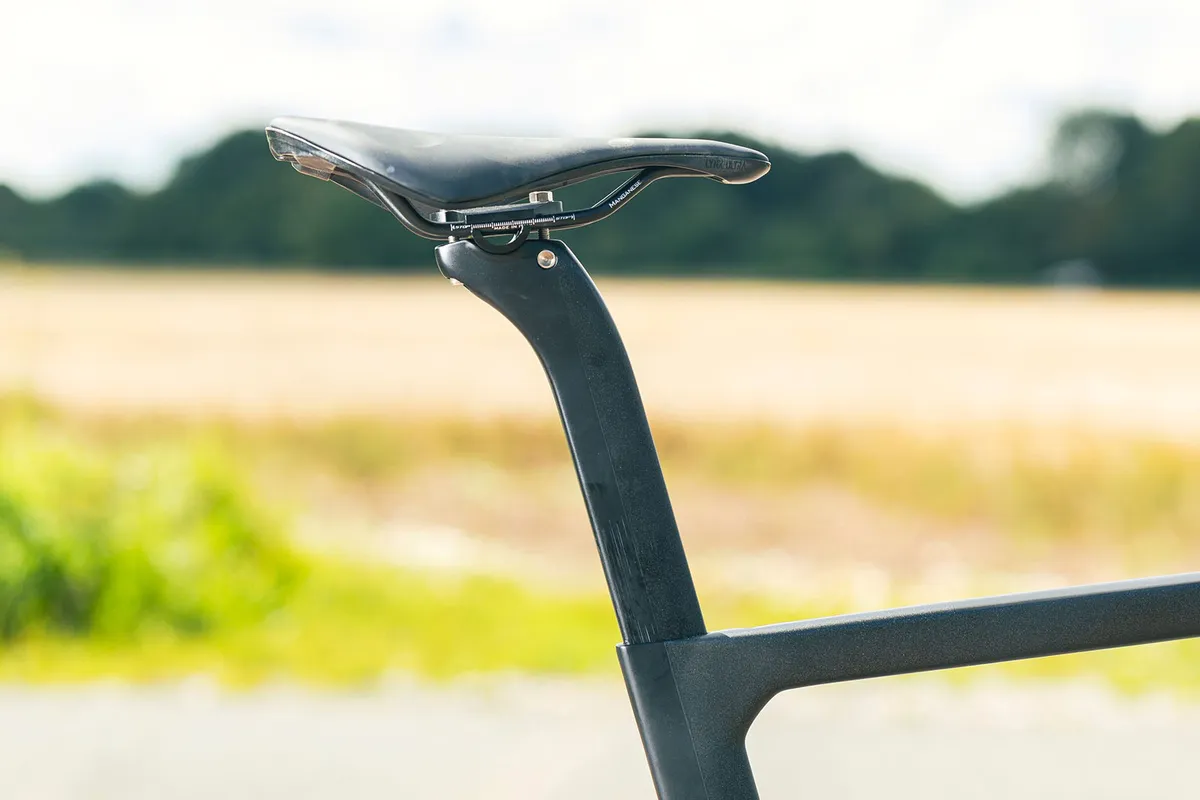
My test bike weighed 8.02kg without pedals, including the integrated computer mount and bottle cages (which are added accessories).
The build will set you back £7,000/$8,800/€8,850 minus those tidbits.
That compares to a Canyon Ultimate CF SLX 8 Di2 at £6,199 complete with 4iiii left-sided power meter at one end of the spectrum, or a Specialized Tarmac SL8 Expert at £6,000/$6,500/€6,500.
Meanwhile, the arguably equally dream-bike-fodder ENVE Melee with a broadly comparable build (albeit more impressive rolling stock) is a far dearer £10,400.
Pinarello F7 Ultegra Di2 ride impressions
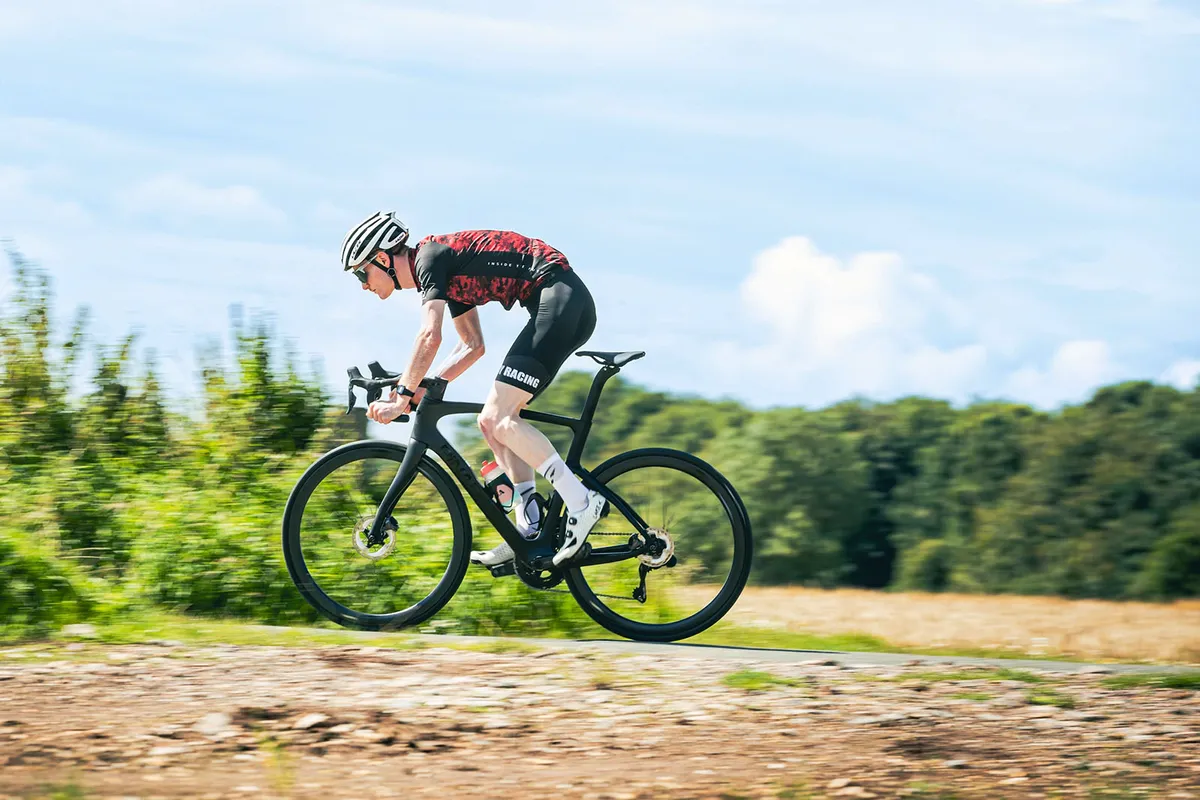
I briefly rode this very bike at its launch in Spain in February 2023, and at the time I couldn’t confidently spot any clear chinks in its arsenal.
Now with the benefit of more time on varying conditions of tarmac and weather, the F7 has confirmed to me much of what was good, but there are more apparent weaknesses worth bearing in mind.
It’s stiff, sharp and downright fast on almost all relevant terrain. It laps up hard efforts on climbs, and is a worthy companion when you need to set a fast tempo – be it on a long shallow incline or on the flat.
The handling is also pin-sharp, responding to very light distributions of weight and inputs at the bars.
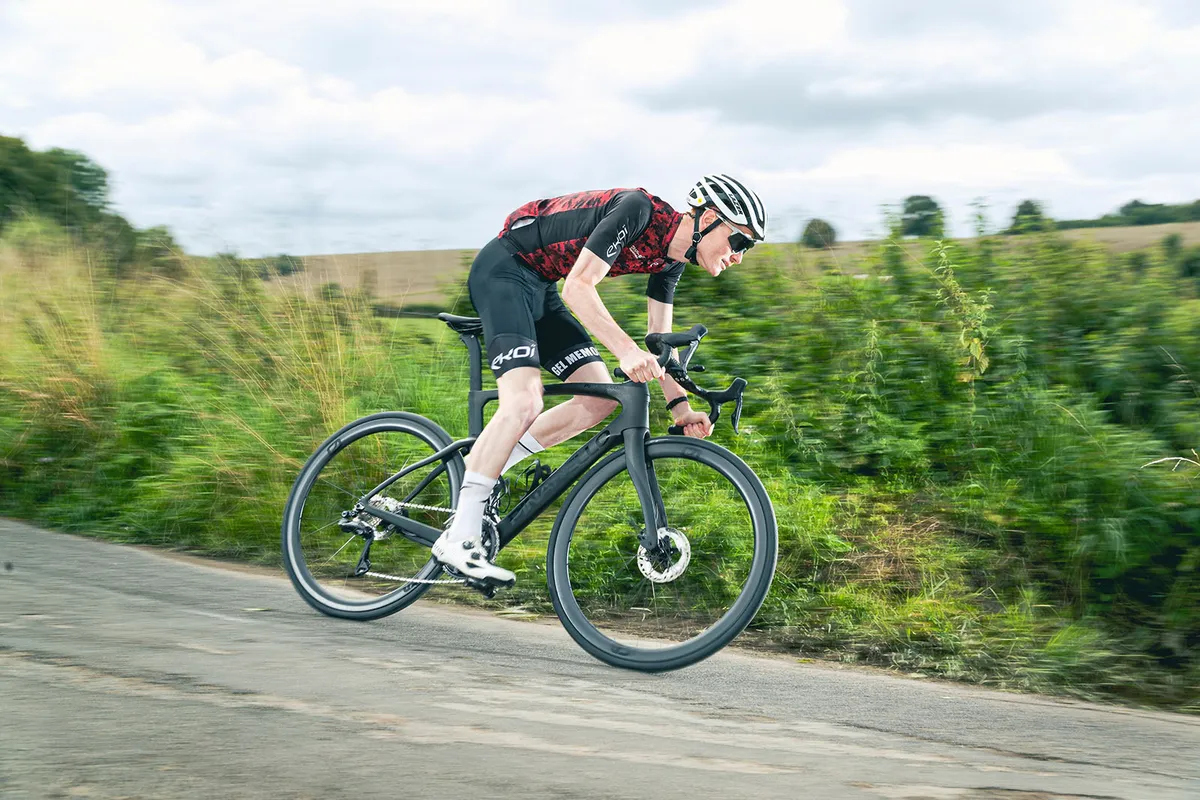
Although the Pirelli P7 Sport tyres bear an upgrade to maximise grip and ride confidence (more on that to come), the frameset delivers an informative ride and – importantly – consistent behaviour.
This was borne out on my often-windy test rides: the F7 shrugged off plenty of sideways gusts, lending an assured sense of composure when I needed it.
Despite its width, I liked the shape of the aero-profiled Most Talon Ultra Light cockpit. It offered comfortable flattened tops to rest on when tapping out a rhythm, while the four-degree drop flare made it easy to transition from hoods to drops.
This let me focus on the business of pedalling hard, which is fundamentally what the F7 is all about.
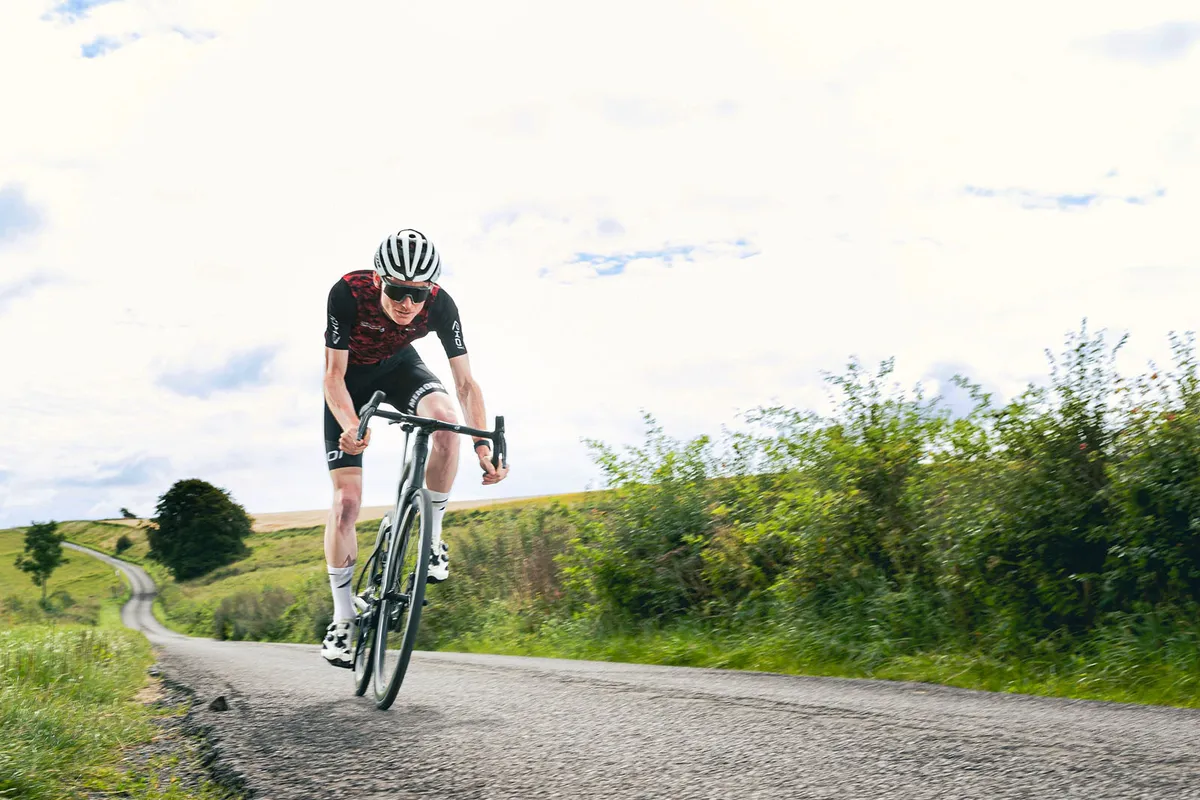
That said, it’s also relatively easy to sit up and take things more sedately. The tall(ish) stack has the potential to take pressure off the lower back and shift weight off the hands, which I found notable when testing this bike alongside the more aggressive Ridley Falcn RS.
However, this doesn’t automatically translate into the comfortable ride some might hope for. The F7 is rigid.
Over broken and pimply tarmac, the ride can become slightly jarring and rough-feeling, which detracts from the overall ride experience.
Of course, those who dedicate their time to riding and racing on well-paved surfaces can rightly overlook this, but if a comfortable Dogma F is what you’re looking for in the F7, you might come away disappointed.
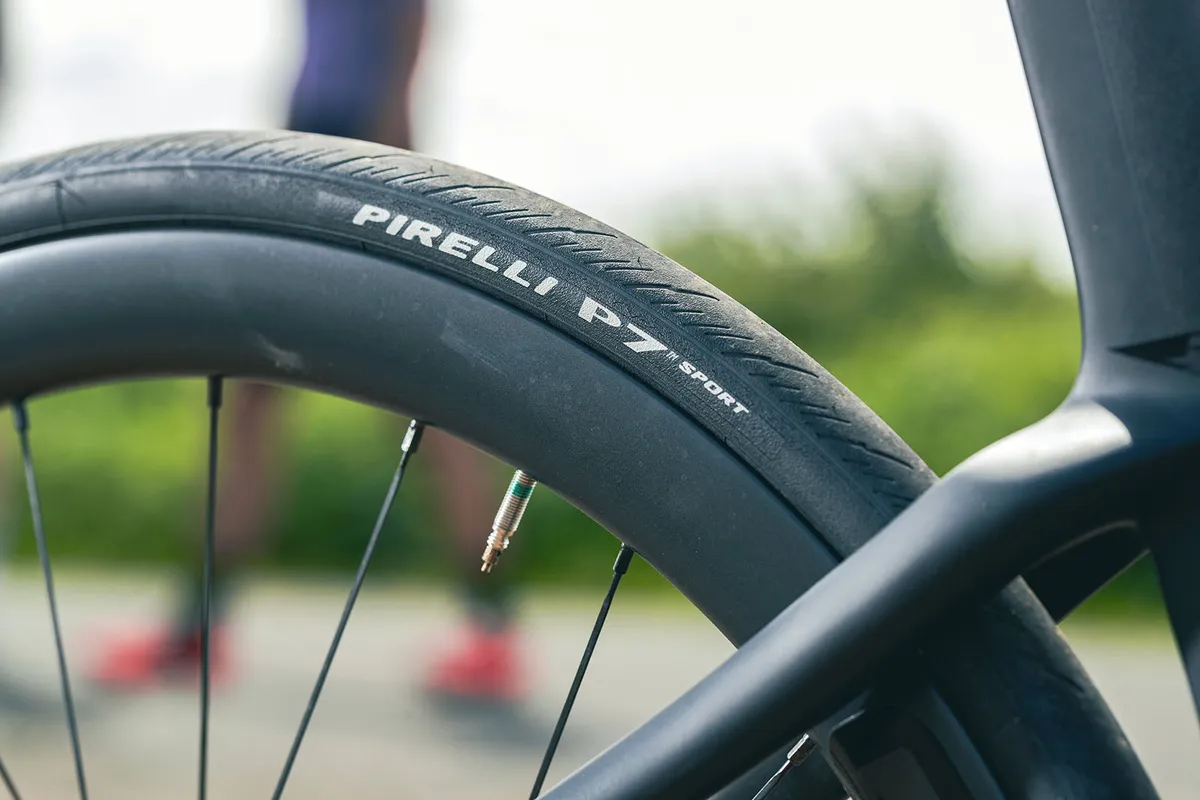
The wheelset and tyres are clear factors here, too. While solid and dependable, I switched them out for a Hunt 54 Aerodynamicist Carbon Disc wheelset shod with equally-sized Pirelli P-Zero Race TLR tyres (set up tubeless) in testing and immediately felt a bit more reactivity and substantially improved ride feel and grip.
I suspect the tyres make the lion's share of the difference in this switch, but there are more progressive wheels around the £1,000 mark.
While a solid starting point, the F7 has the potential to be even better if installed with one of the best carbon road bike wheels (that needn’t cost mega money).
Pinarello F7 Ultegra Di2 bottom line
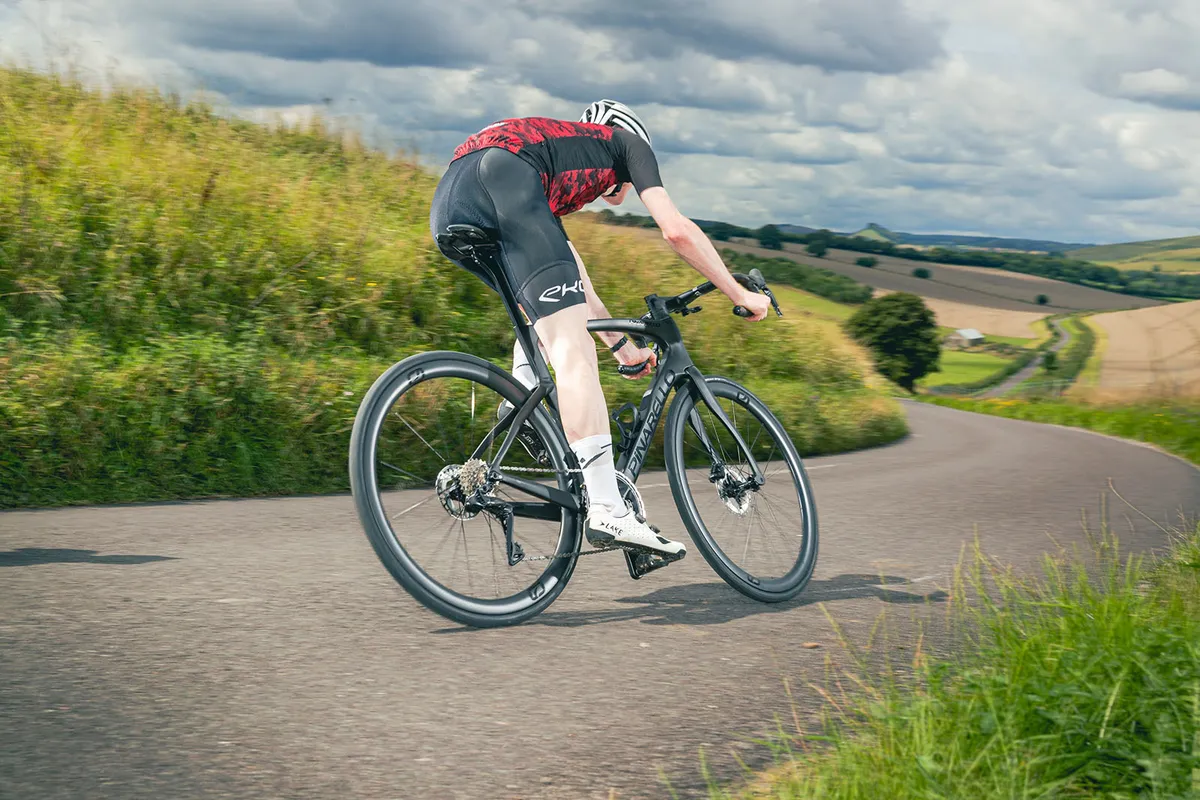
The Pinarello F7 is certainly a fast and stiff race bike, with keen handling and a definite turn of speed that makes it competitive when ridden hard on well-treated surfaces.
This frame might not be used by Ineos-Grenadiers riders, but the geometry (and therefore the meat of the handling) is the same as the Dogma F, while the aesthetic traits are clear to see.
For many, this will make for an enticing proposition: in theory, the F7 could be all the Pinarello race bike you’ll ever need without paying the premium for the brand’s flagship bike.
However, the F7’s ride borders on harsh when the road surface isn’t favourable, the one-piece cockpit options won’t cater for all, and the rolling stock is unspectacular.
If you’re happy with the cockpit sizing, a smart upgrade of rubber (then wheels) will unlock an improved overall ride experience.
Product
| Brand | Pinarello |
| Price | €8850.00, £7000.00, $8800.00 |
| Weight | 8.02kg |
Features
| Fork | Pinarello Onda, carbon |
| Stem | Most Talon Ultra Light, carbon |
| Chain | Shimano Ultegra |
| Frame | Pinarello F, Toray 900 carbon |
| Tyres | Pirelli P7 Sport, 700x28c |
| Brakes | Shimano Ultegra R8120 hydraulic disc |
| Cranks | Shimano Ultegra R8100, 52/36 |
| Saddle | Most Aircross |
| Wheels | Most Ultrafast 40 |
| Shifter | Shimano Ultegra Di2 R8100 |
| Cassette | Shimano Ultegra R8100, 12-speed, 11-30t |
| Seatpost | Pinarello Aero, carbon |
| Handlebar | Most Talon Ultra Light, carbon |
| Bottom bracket | Italian threaded |
| Available sizes | 430, 465, 500, 515, 530, 560, 575, 595 |
| Rear derailleur | Shimano Ultegra Di2 R8100 |
| Front derailleur | Shimano Ultegra Di2 R8100 |
